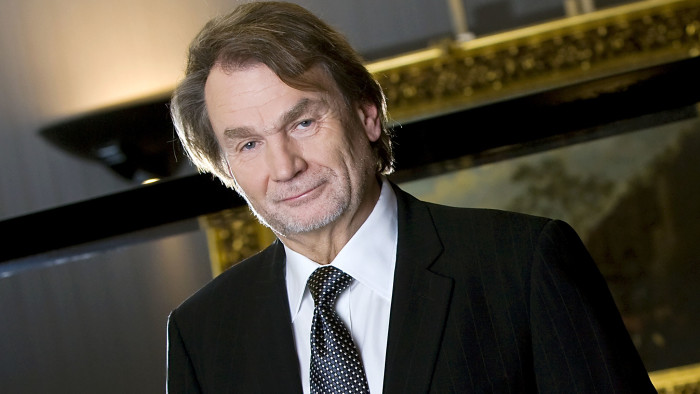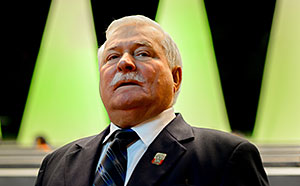Why Jan Kulczyk is Poland’s empire builder

Roula Khalaf, Editor of the FT, selects her favourite stories in this weekly newsletter.
Jan Kulczyk’s funeral was billed as a private event, but that would not have been apparent from the long list of former presidents, politicians and business leaders who packed into the Poznan church to pay their respects to Poland’s most prominent businessman.
Entrepreneur, investor, philanthropist and the country’s richest man when he died in July, Kulczyk was Poland’s pre-eminent capitalist, a man whose career charted much of the country’s remarkable 26-year journey from post-Soviet chaos to the EU’s fastest-growing economy.
A bold, opportunistic businessman who made his fortune buying and selling state companies in the tumultuous early years of the Polish republic, his role in the country’s transformation made him, to many businessmen, as much of a statesman as Lech Walesa, former Solidarity leader and president, or Aleksander Kwasniewski, another former president, both of whom attended his funeral.
But like many of those in eastern Europe who emerged from the turbulent post-communist years with their bank accounts flush with cash, Kulczyk was dogged by suggestions of sleaze and corruption and allegations of all-too-friendly relationships with politicians both before and after 1989. This, too, made him an integral part of the Polish transition story.
“With its lights and shadows, its undisputed successes but also its shortcomings and errors . . . Kulczyk was an active participant in this transition, even its symbol,” wrote Miłosz Weglewski in Newsweek magazine after Kulczyk’s death.
In his early business career, Kulczyk led, and ultimately became the main proponent of, the privatisation and financial reform drive that unleashed Poland’s economic boom and today brings in billions of dollars of foreign investment to the country every year.
Then, armed with the lucrative proceeds, he remodelled himself as a global investor, becoming the country’s most well-known businessman and demonstrating to his peers that capital did not only have to flow from west to east. And even in death at 65, following a routine medical operation in Vienna, Kulczyk’s seemingly well-laid succession plan for his empire, through his 34-year-old son, tackled a pressing challenge that looms large for many business empires built in the post-communist era.
Much like Henry Ford or Steve Jobs, Kulczyk senior is already being written into history as someone who played a role larger than his business and made a mark on Polish society at large.
“All those who are alive today follow in his footsteps,” wrote Boguslaw Chrabota, editor-in-chief of Rzeczpospolita, a leading Polish daily, following his death.

But to others he was simply a creature of his time. If he had not made billions from buying up inefficient and poorly managed state-run assets and then selling them on to investors eager for a slice of a new emerging market, someone else would have.
Kulczyk, who was a successful businessman before the fall of the Berlin Wall as the sole Polish importer and dealer of Volkswagen cars, built an empire that spanned across telecoms, insurance, automobiles and petroleum, almost all of them bought from the post-communist state. So much so that at the time of his death, his reputation was difficult to separate from that of the country’s financial evolution that made him worth $4bn, according to Forbes magazine.
Those who cheered the sales of state-owned enterprises and economic overhaul heralded Kulczyk as a visionary. Those who remained suspicious of the speed and depth of the fiscal reforms criticised him as a corrupt financial alchemist.
Some saw Kulczyk as leeching on the state: buying assets from the taxpayer and selling them to the highest private bidder for a healthy profit. Others noted his close relationship with politicians — Kwasniewski sits on his holding company’s advisory board and Kulczyk used to accompany Walesa on overseas trips.
Those critics felt vindicated when Kulczyk became embroiled in a scandal involving allegations of improper government influence over PKN Orlen, Poland’s largest oil company.
Kulczyk, then an Orlen shareholder, was accused of attending a secret meeting with former KGB spy Vladimir Alganov, then representing the Russian energy industry.
Hauled before a parliamentary commission investigating the company’s governmental dealings, Kulczyk denied wrongdoing. But the resulting controversy sullied his reputation in Poland and precipitated a shift in his attention, and business dealings, overseas.
But even then, as he turned away from his country of birth, moving to spend more time in London and selling down his Polish assets, Kulczyk again found himself leading the way.
His investments in African energy and mining ventures total more than $1bn and his 3 per cent stake in global brewer SAB Miller is worth about $2.5bn.
As leading Polish companies such as KGHM and Grupa Azoty begin to take tentative steps outside Poland through purchases of overseas companies, they are in part following his lead.
“How much personal courage and determination it required to compete with global giants,” wrote Chrabota. “But he was not afraid. He took the gloves and won. Also for Poland.”
But perhaps Kulczyk’s most important contribution to the Polish business story is in his prescient succession planning, which saw his son Sebastian take charge of the family business in 2013.
Across Poland, and the rest of the former Soviet Bloc countries that are now members of the EU, contemporaries of Kulczyk senior who bought, borrowed or bet their way to billions acquiring former state-owned businesses in the privatisation boom following the collapse of the Iron Curtain now find themselves heading into retirement without a plan in place.
Unlike businesses in the west, where succession is a key part of future planning, many eastern European businesses that were formed in the early 1990s have been run by the same people since and as such have no experience in handling management transition, or consider it an important issue to plan ahead for.
If the shift to Kulczyk’s son proves a success in the coming years, his father’s legacy as both a shrewd investor and a forward-thinking manager will appear far harder to challenge.
Comments